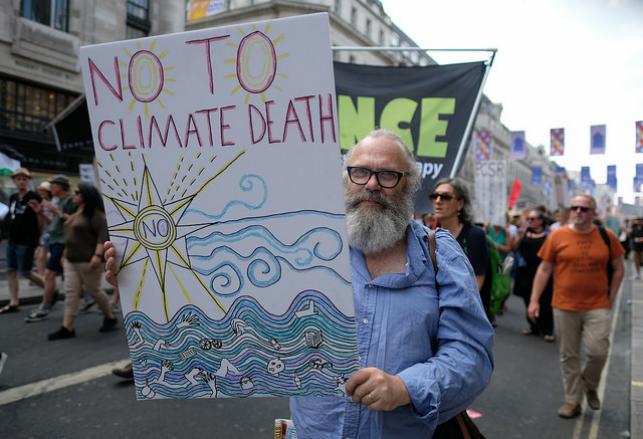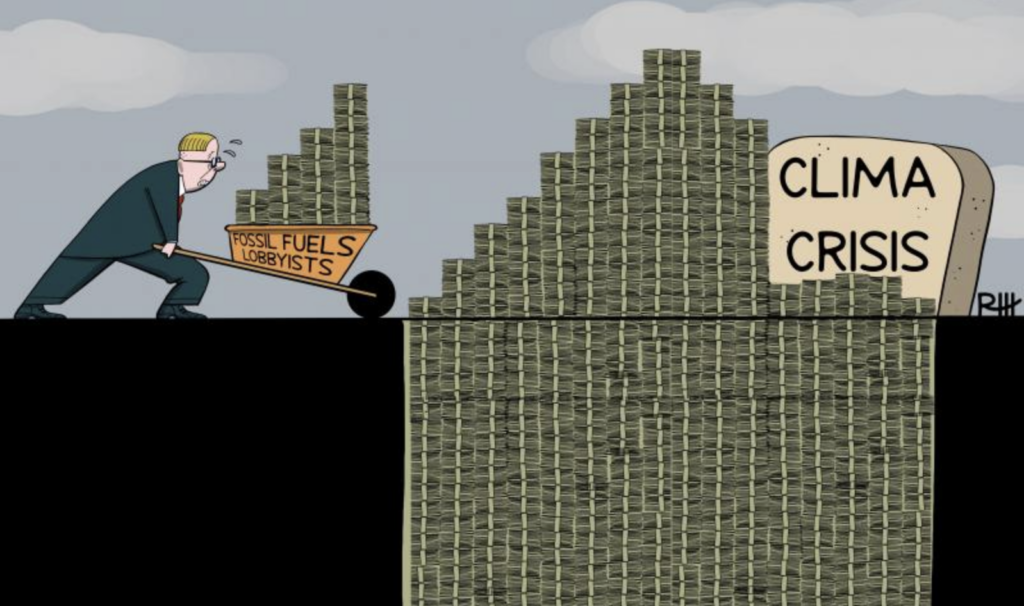By Ben Wray from Commonspace.
This is Climate Week in Scotland, just as scientists meet in the South Korean city of Incheon for crucial Intergovernmental Panel on Climate Change (IPCC) talks ahead of a much anticipated report publication.
The anticipated outcome of the report (which will be published on 8 October) is that the IPCC will agree that emissions can rise no further than 1.5 degrees C above pre-industrial levels to stop catastrophic climate change. We have already passed the one per cent mark.
The Paris Summit agreed to keep emissions to “well below two degrees C above pre-industrial levels and to pursue efforts to limit the temperature increase even further to 1.5 degrees C”, and a scientist at Incheon told the BBC that if the world were to adjust to fulfil the 1.5 degrees C limit “our lives would never be the same”.
Those talks come after a summer heatwave which has heightened consciousness around the issue of climate change around the world. After a summer of forest fires in Sweden, the issue became a hot topic in the country’s elections last month. And in Scotland concern about climate change has been rising, with the Scottish Household Survey published last month showing that Scots are increasingly worried that climate change has become an “immediate and urgent problem” requiring action, rising from 46 per cent to 61 per cent in the space of four years.
The Scottish Government has long been lauded internationally as a leader in its commitment to reducing carbon emissions, with its 2009 emissions targets considered by the UN to be among the most ambition in the world at the time. Those targets have been met ahead of schedule, with Scotland only trailing Sweden in Western Europe in terms of emission reduction performance to date.
But nine years on, as scientists recalibrate their assessment of the speed with which emissions is undermining the world’s ecosystem and as we begin to see the real world effects kick-in, is Scotland still leading internationally?
At First Minister’s Questions last week a sharp exchanged ensued between Nicola Sturgeon and Greens co-convenor Patrick Harvie, where the latter said that a new BP oil development in the North Sea could make Scotland’s reputation as a climate leader a “sham”.
This brought about a strong rebuke from the FM, who defended her government’s climate credentials and called for a more positive tone from the Greens, saying they should “take some pride in the fact that they are in a country that is recognised internationally as a world leader”.
What’s the truth? Is Scotland maintaining its position at the forefront of the fight against climate change, or is it in danger of falling behind?
In terms of targets, the draft Climate Change Bill has toughened targets for emissions reduction to a 66 per cent fall by 2032 and 90 per cent by 2050. Friends of the Earth Scotland have stated that unless the First Minister “aims higher and improves” the targets, “Scotland cannot claim to be an international climate leader” any longer.
This was backed up by Mark Ruskell, Mid Scotland and Fife Green MSP, who said: “There is mounting scientific evidence, including leaks from the IPCC’s upcoming global climate targets report, that unless decisive action is taken now we will see dangerous levels of warming by the 2040s. As a result, Scotland risks falling behind many countries, including Sweden, Iceland and New Zealand, who have committed to net-zero targets by 2050 at the latest.”
Like what you’re reading? Donate here to support DeSmog UK‘s journalism today
Sweden is perhaps ahead of the field with a statutory obligation to be carbon neutral by 2045. France and Portugal are aiming for carbon neutrality by 2050, Iceland by 2040, while New Zealand is pursuing a “net-zero bill”, with a commitment from the government to be carbon neutral by 2050. Pressure is even being applied on the UK Government to establish a net-zero target, with 130 MPs signing a letter calling on the UK to be carbon neutral by 2050.
While the Scottish Government’s 90 per cent reduction by 2050 includes being carbon neutral, Friends of the Earth say that the aim should be to be neutral in all greenhouse gases, include toxic gases like methane. A Friends of the Earth Scotland spokesperson added: “With countries including Sweden, France and Portugal already committed to cutting their climate emissions to net-zero by 2050 or before, it’s hard to see how the Scottish Government can claim to be world leaders when they’re only aiming to reach 90 per cent cuts by 2050.
“But 2050 is far too late for the millions of people around the world already dealing with devastating climate impacts. Next week’s report from the IPCC will make clear that all countries need to step up and urgently cut emissions, and Scotland is no exception. If we’re serious about curbing dangerous climate change, we need to see much more effort within the next decade.”
A progress report by the Committee on Climate Change (CCC) published last week said that the new targets were at “the limits of feasibility” based on the policy proposals in the climate change plan, while “more effort” would be required if that was to be increased to 100 per cent.
The committee highlighted the fact that a rapid fall in emissions in energy generation was “masking a lack of action in other areas”, where there had been “no significant emissions reduction…for the past five years”, as the graph below from the CCC report clearly shows.
“If the emissions reduction to 2032 is to be achieved, similar policy advancements must be made across sectors including low-carbon heat, non-domestic buildings, agriculture, forestry, and waste,” the committee report found.
The report, which praised the Scottish Government for being significantly ahead of the UK Government, went on to be particularly critical of efforts in agriculture, which they said has no “regulatory approach in place”, and “ambitions for emissions reduction have been further scaled back”. The CCC added that targets for tree planting and peatland restoration have been “continually missed” and said that “not all our recommendations have been implemented”.
Craig Dalzell, head of policy and research at the Common Weal think-tank, said the CCC report shows that the “extremely significant” progress that has been made in emissions reduction has been primarily based on “rather low-hanging The CCC report found that “transport is now Scotland’s biggest sectoral challenge”, and Ruskell – who described the Scottish Government as “climate weak” – called on the First Minister to do more to step up use of electric vehicles and bike journeys.
“Sales of electric vehicles in Scotland are now also behind the UK and emissions-heavy car journeys are rising, while low carbon transport options are experiencing a decline. The Scottish Government has an unambitious target for 10 per cent of everyday journeys to be made by bike in 2020, but so far it sits at 3 per cent,” he said.
Are any of these changes on a large enough scale to produce the sort of rapid, systemic shift that will inevitably have to fundamentally alter the nature of our economy and society?
One draft paper for the UN 2019 sustainable development report by Finnish scientists has stated that advanced economies must be carbon neutral by 2040, and the rest of the world by 2050, to prevent catastrophic climate change. They argue that the current market-based economy “cannot accomplish the task” of delivering this sort of rapid green transition, and stated that this can only be delivered by a fundamental shift in how the economy is organised towards state-led planning, where the emphasis in current economic orthodoxy on balanced budgets and low state deficits was replaced by a “Keynesian world with planetary boundaries”. “This would require economic thinking that enables large public investment programs on the one hand and strong regulation and environmental caps on the other. In the modern global economy, states are the only actors that have the legitimacy and capacity to fund and organize large-scale transitions,” they add.
Considered in this light, perhaps our understanding of make a country an “international leader” has to change from being based on comparison with other countries targets and delivery, to being bold enough to do what the science says needs to be done.fruit”, leaving the more politically and financially challenging areas like transport (which could involve increasing costs for car usage and a major and costly overhaul of infrastructure) and heating (which infringes on the ‘big six’ energy companies and house builders) still to be addressed.
“As Scotland makes the systemic changes required to decarbonise the transport sector and building heating (which together comprise 75 per cent of total energy demand) then this will place additional burden on the electricity generation sector,” Dalzell said. “Common Weal has released several reports calling for all new buildings to be constructed to passive heating standards and for substantial acceleration in retrofits. Similarly, we have called for a systemic review of the UK national grid connection charges and feed-in tariff schemes to better support Scottish renewables. Without these, the goal of a zero-carbon Scotland will not be met.”
Ben Wray is the editor of CommonSpace and tweets at @ben_wray1989
Image credit: Alisdare Hickson
Subscribe to our newsletter
Stay up to date with DeSmog news and alerts








